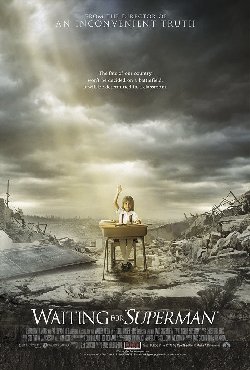TC Faculty Still "Waiting for Superman"
Responding to Controversial Documentary,
TC Faculty Panelists Are Still “Waiting for Superman”
Even the balcony was full at the Joyce Berger Cowin Conference auditorium for the September 17 advance screening of the controversial film Waiting for Superman, which premieres in theaters on September 24. The TC screening was followed by a panel discussion by faculty members Barbara Wallace, Erica Walker, Michael Rebell and Jeffrey Henig; and moderated by Yolanda Sealey-Ruiz. Aaron Pallas introduced the provocative documentary about dysfunctional American schools by Davis Guggenheim, who is looking to reprise the national movement against global warming spurred by his Oscar-winning 2006 film, “An Inconvenient Truth.”
Waiting for Superman chronicles the saga of five families forced to rely on a nail-biting lottery to get their children into charter schools in Harlem, the Bronx, Los Angeles, Washington, D.C. and even a school in middle-class, suburban Palo Alto, California. To reinforce the tension and suspense, the film suggests that the children’s neighborhood public schools are so bad that charter schools—public schools that receive private funding—are their last and final hope for success in life.
The panelists all shared the view that the film was much too simplistic in arguing that the main problem in public education is rigid union contracts that protect the jobs of bad teachers. They said reality is much more complex than that. Rebell questioned Guggenheim’s use of work by Eric Hanushek, a researcher at the Hoover Institution of Stanford University, to make the case that removal of the bottom tier of poorly performing teachers would significantly raise students’ test scores.
“Hanushek’s data indicates that students who have highly effective teachers achieve substantial gains in test scores, and the more years you have an effective teacher, the more the scores escalate,” Rebell wrote later in an e-mail. “The problem is that we (including Hanushek) don’t know in advance who is a ‘highly effective teacher.’ …You only know who is effective after the fact by seeing how well the pupils actually performed. So I question how useful this information really is.”
Walker contended that the film ignores many excellent, traditional public schools. She noted that charter schools serve only three percent of students, and even Guggenheim concedes in the film that only one-fifth of charter schools are successful.
Henig asserted that the charter school model is not replicable on a large enough scale in the United States to have a meaningful impact. But Wallace said she viewed the film as a “call to arms” to education reform, “the civil rights movement of the 21st century.” Teachers College should be a leader of that movement, she said, through research that can be carried into the classroom, so that the changes made in education can be based on evidence. “We should be talking about what we can do as a top school of education to provide leadership,” Wallace said.
The screening was sponsored by the Office of the Vice President for Diversity and Community Affairs as part of the Office’s commemoration of Constitution Day.
Published Monday, Sep. 20, 2010
